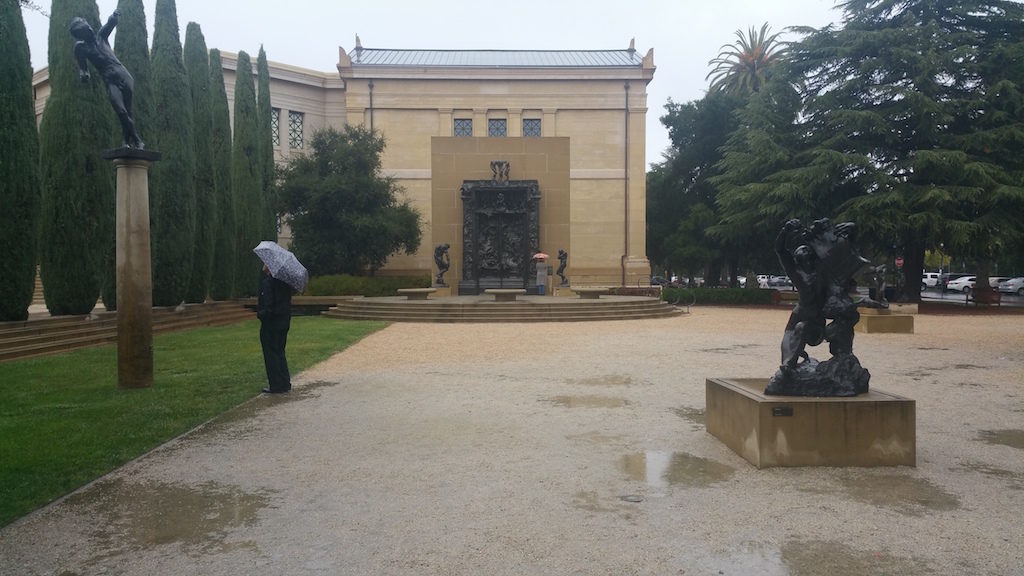Yesterday morning I joined my colleagues Natalia Mehlman Petrzela and Anthony Chaney on a panel discussing California’s place – and California as a place – in postwar American thought. Kerwin Klein, our chair and commenter, served as a lively conduit to bring out some of the crucial common themes running through our individual papers. And, as is always the case at the USIH conference, questions from audience members during the Q&A teased out aspects of thought that will enrich our work as we each move forward on these different projects.
 Not until our panel was finished did I come out of my tunnel of presentational angst and notice the backdrop for our talk. Through the floor-to-ceiling screened windows of Tressider’s Oak West conference room, our audience could view the splendor of California itself, or at least some of the glories of this corner of it: a verdant and variegated canopy of palm trees, pine trees, cedars, and California oaks, parting here and there to reveal warm sandstone walls and red tile roofs glinting in the sun against a partly cloudy sky of brilliant blue. That’s Stanford. And a fragrant garden all misty wet with rain is Stanford too.
Not until our panel was finished did I come out of my tunnel of presentational angst and notice the backdrop for our talk. Through the floor-to-ceiling screened windows of Tressider’s Oak West conference room, our audience could view the splendor of California itself, or at least some of the glories of this corner of it: a verdant and variegated canopy of palm trees, pine trees, cedars, and California oaks, parting here and there to reveal warm sandstone walls and red tile roofs glinting in the sun against a partly cloudy sky of brilliant blue. That’s Stanford. And a fragrant garden all misty wet with rain is Stanford too.
In these few days here, I have revisited as many lovely vistas of the campus as I could. But I also seized the chance to have a cup of coffee with one of my former professors, now emeritus, who is still teaching and still kicking and still warmly engaging. He regaled me and my trailing spouse (a good sport, and the best of men) with one charming story after another, and asked after our life and our love and our work and our world. And I told him how much his teaching had meant to me. The books from his class on Native American poetry were among the books I’d kept, and I still read them sometimes – The Sky Clears, Coyote Was Going There, Finding the Center. When we got up to go, I told him simply, “You have blessed my life.” And that is certainly true.
In conclusion, it was good to be here. We missed so many of you who were not able to make it, and we hope to see you next year in Dallas.
In the meantime, I will take my leave of this beloved place, and of my beloved friends, until we meet again, with a few sentences from the conclusion of my paper from yesterday. They were topical, of course, but they are broad enough, I think, to express something of what I believe we all are about and can all mean for one another.
Despite what some of you – some of us – profess from time to time about the relationship between ideas and life, I am increasingly convinced that we ought to treat them as inseparably, mutually embedded in one another. There is no human life without mind, without thought. But there is also no thought, no idea, without human life. If we think about the canon wars or the gender wars on campus as a battle over ideas in the abstract, we are going to continue to misapprehend our own battles today. Because we don’t live in the abstract. We are alive for one another, concretely, completely, complicatedly, in the round – friend and foe, enemy and ally, adjunct and administrator, student and professor. Yes, the battles and skirmishes of academic politics have always been about ideas, about the life of the mind. But they have also been about the very means – our very means – of living. Academic politics matter, just as ideas matter. They matter because we do.

One Thought on this Post
S-USIH Comment Policy
We ask that those who participate in the discussions generated in the Comments section do so with the same decorum as they would in any other academic setting or context. Since the USIH bloggers write under our real names, we would prefer that our commenters also identify themselves by their real name. As our primary goal is to stimulate and engage in fruitful and productive discussion, ad hominem attacks (personal or professional), unnecessary insults, and/or mean-spiritedness have no place in the USIH Blog’s Comments section. Therefore, we reserve the right to remove any comments that contain any of the above and/or are not intended to further the discussion of the topic of the post. We welcome suggestions for corrections to any of our posts. As the official blog of the Society of US Intellectual History, we hope to foster a diverse community of scholars and readers who engage with one another in discussions of US intellectual history, broadly understood.
(A twitter feed aggregating tweets to the #USIH2016 is up at my personal blog — twitter plugin is currently not working for us on this website, or I’d have posted it here.)